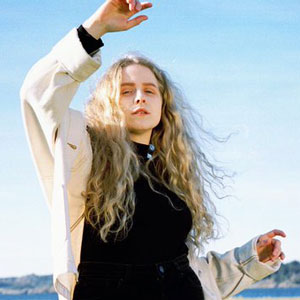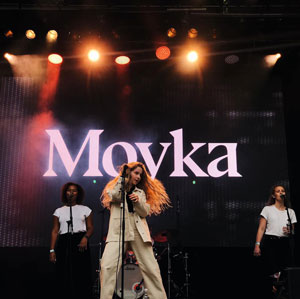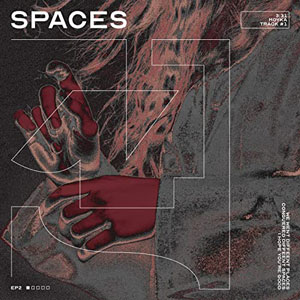
One-woman pop factory: Moyka
Newcomerin aus Norwegen
Als einer von acht Geschwistern und Tochter einer Putzfrau und eines Lastwagenfahrers war ihr die musikalische Karriere eigentlich nicht in die Wiege gelegt. Aber ihre Kindheit und Jugend im ländlichen Hallingdal und ihre Ausbildung in Musikproduktion in Bergen erwiesen sich als fruchtbarer Boden, um die eigenen musikalischen Fantasien auszuleben. Dabei „nur“ als Sängerin bzw. Songwriterin zu fungieren, kam für sie nicht in Frage; nur wenn sie auch die Produktion übernähme, „gehöre“ das Lied ihr. „I wasn’t interested in playing solos and being technical on the guitar. The synth world was something new – and being good at that gives you a lot of power for yourself, in terms of the kind of expression you want. I never started out picturing what other people might say“, sagt die Norwegerin selbstbewusst über ihre Ausbildungszeit.
In den fünf Songs ihrer neuen EP dreht sich alles um den Verlust ihrer langjährigen Jugendliebe, den Moyka letztes Jahr durchlebt hat. Um die Trauer und den Schmerz und die vielen Leerstellen, die plötzlich entstehen, aber auch um die kreative Energie des Neuanfangs. Dabei ließ sie sich vom Co-Writer Eirik Hella unterstützen, mit dem sie sich mittels eines kleinen, aber feinen Synthie-Equipments austobt. Was ihr geholfen hat, in einer Männerdomäne ihren Weg zu gehen und was ihr als Künstlerin wichtig ist, erzählt sie uns im folgenden Interview.

Foto: Robin Larsen
You grew up in a rural environment, in the Hallingdal Valley in Norway. What music did you grow up with?
I grew up with a lot of pop and rock actually. Things my mom played for me and my siblings. I remember dancing on top of chairs to ABBA, Queen and Madonna in our living room growing up. I also discovered a lot of music myself when I got older and the internet slowly came into my life.
Later on you moved to Bergen to study music production. What was your experience like at the university and the big city?
It was actually a big change for me. Even though I had a connection to Bergen through my family growing up, it’s something different to move by yourself to a big city compared to where I am from. I got to know new people, and grow as a creative person and I feel like that takes a lot of courage to do. The university was really nice. I became good friends with incredible and talented people and got to do what I loved without consequences the years I went there!
Have you had any experience in songwriting and music production before?
In high school I wanted to record my own music because I had a spree where I started to make loads of, loads of songs. So I bought myself a starter pack with an audio interface, headset, microphone and a limited music-making-program. When I started to dive more into it and saw what you could actually do, that’s when I decided I wanted to study it and learn more about it.
What excites you about working as your own producer? What are the pros and cons?
The best thing about it is to get really into it and just try stuff out and learn from it. But sometimes I get really impatient with the process. That’s what makes it really good to produce with the help of other people, too. Then you learn from each other and talk about the direction and ideas which is nice! – get out of your head a little bit!
How are your songs created, what inspires you?
I find that really hard to answer because it’s very different each time really. But it usually starts with an idea – maybe a word or a sentence with a melody or a sound that inspires a kind of direction. What inspires me most is people and relations. But it’s also very interesting and inspiring for me to write in different places.
 The central theme of your new songs is the loss of a first love and the energy of a new beginning, a really personal matter. Was ist helpful to write about it to become aware of what’s going on?
The central theme of your new songs is the loss of a first love and the energy of a new beginning, a really personal matter. Was ist helpful to write about it to become aware of what’s going on?
Yes, definitely. First I didn’t want to write about what I went through because I felt it was so personal. But after a while I realised I couldn’t deny myself to be honest and open about what I was feeling. That’s the most important thing I’ve learned from this process actually. It really came from a painful, but honest place. I was really nervous when I released the first singles because of just that, but it also showed me that there are a lot of people that feels the exact same as me. Which shows it’s important to write about it.
Why do you think is the profession as producer still so male-dominated?
I think it has a lot to do with that’s how it’s been so many years. There is an imbalance there, so maybe it can be a bit scary to start for girls. I also think it has a lot to do with how we grow up as kids. There are so many things that is “gender defined” from when we are really, really young, which I think is so silly. Just because you’re a certain gender doesn’t mean you’re unqualified to do something. It’s important for women and girls to come forward in those environments to show younger girls that it’s not scary to let out your creativity by producing. The term “producer” has also changed a lot, which means you can make it what you want to yourself. You don’t have to own a ton of equipment to thousands of dollars and have like a big studio and all that. You can do your own thing!
What could be done to encourage more female songwriters to be their own producers?
I think the most important thing is to support and front female artists and producers and sound technicians to show younger girls that it’s possible! It’s important to have people to look up to. That has been really meaningful to me growing up. I feel like they do a great job here in Bergen with a thing called AKKS. It helps young girls to get into music. And that is absolutely something the music industry needs!!!!! MORE GIRLS PLEASE.
What are you next steps and wishes for the future?
My next step is to release this new EP of mine! I’m very excited about that. My wishes for the future is that I wish the situation betters for the world and that people have had time to think about what the world can look like post-corona. We have an opportunity to make things better when it comes to the environment, human worth and existence, the fight against racism and the fight towards more diversity. That’s my biggest wish!
10.06.2020

